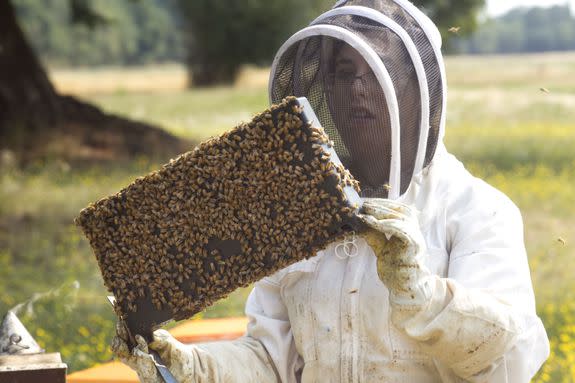In a first for U.S., this bumblebee is now officially 'endangered'

This might be the Trump administration's first pro-environment move.
The rusty patched bumblebee is now on the endangered species list, making it the first bee species in the continental United States to be considered endangered, the U.S. Fish and Wildlife Service (FWS) announced this week.
SEE ALSO: Not everyone's thrilled Cheerios gave away 1.5 billion wildflower seeds to save the bees
The species is "balancing precariously on the brink of extinction," the agency said on Tuesday. "Just 20 years ago, the rusty patched bumblebee was a common sight, so ordinary that it went almost unnoticed as it moved from flower to flower, collecting nectar and pollen."
The decision came as a huge relief to environmentalists, who said they worried the Trump administration would scrap the effort.
The FWS had approved the bee's endangered listing in the final days of the Obama administration. Shortly after taking office, however, President Donald Trump issued a sweeping "freeze" on Obama-era federal regulations.
On Feb. 9, a day before the bee order was supposed to take effect, the Trump administration delayed the listing until Feb. 21. The Natural Resources Defense Council quickly filed a lawsuit asking a federal court to stop FWS from "violating the law" by delaying the rule without public comment or notice.
"The Trump administration reversed course and listed the rusty patched bumblebee as an endangered species just in the nick of time," Rebecca Riley, a senior attorney with the environmental group, said in a statement released this week.
Now the real work can begin.
By listing a species as endangered, the FWS is required to devise plans for creating "a healthy and secure condition" in the areas where the species is native. That might mean limiting or redefining development in places that are critical to the species' survival.

Image: natalie behring/Getty Images
A handful of business groups, including the American Petroleum Institute and the National Association of Home Builders, filed an "emergency petition" asking Trump officials to extend the freeze until Jan. 11, 2018.
Opponents said the Obama administration didn't take enough time to consider how the bee's listing would "profoundly" affect human activities, such as residential development and crop production.
But efforts to protect rusty patched bumblebees had been underway for years.
Once common across the East Coast and Midwest, the bee species has disappeared from about 90 percent of its range in the past two decades. As with many bee types and pollinators, heavy use of pesticides, sprawling real estate development, climate change and other factors have contributed to staggering population declines.

Image: fairmont.com
Nectar-loving pollinators play a vital role in sustaining our ecosystems by enabling plants and food crops to thrive and reproduce. As their habitats shrink, however, so do their numbers.
The Xerces Society, which filed the petition triggering the government's consideration of the rusty patched, said it was "thrilled to see one of North America's most endangered species" receive much-needed protection.
"This is a positive step towards the conservation of this species, and we now have to roll up our sleeves to begin the actual on-the-ground conservation that will help it move toward recovery," Sarina Jepsen, director of endangered species at the Xerces Society, said in a statement.
